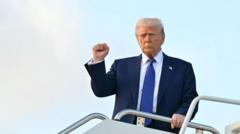In a mere seven weeks into 2025, it appears we may be on the verge of a monumental shift in world affairs reminiscent of transformative years like 1968 and 1989. The influence of Donald Trump looms large, fundamentally altering the geopolitical landscape.
Throughout the post-World War II era, U.S. presidents have generally adhered to key principles aimed at safeguarding global stability, particularly with respect to Europe and Asia. In stark contrast, Trump has prioritized "America First," suggesting a transactional approach to global safety that prioritizes U.S. costs above international commitments.
This change is perplexing for allies, particularly in Europe, where Trump's brash persona complicates traditional diplomatic relations. Former officials have drawn comparisons between Trump and historical figures like Louis XIV, criticizing his vanity and thin skin, which might prompt advisers to overly align with his opinions for their own security.
Recent statements regarding Ukraine have sparked controversy. While seeking to end the conflict by Easter, Trump's rhetoric has aligned with Russian narratives, leading to a volley of criticism from both sides of the ocean. This includes claims about Ukrainian President Zelensky, who is increasingly positioned as vulnerable to negotiation pressures distinct from his Russian counterpart, Vladimir Putin.
International diplomats express frustration over Trump's perceived naivety regarding diplomatic leverage. Many argue urgent concessions from Russia could have been negotiated but were overlooked by the current administration. The possibility that this approach could erode centuries of influence for the U.S. has raised alarms.
Looking ahead, political analysts caution that although Trump currently maintains a firm grip on U.S. leadership via Congress and the Supreme Court, upcoming mid-term elections could diminish his influence. A scenario that sees loss of congressional control may change his capacity to execute controversial strategies.
Furthermore, bogged down by inflationary pressures, there is a concern among voters regarding economic stability, directly impacting Trump's support base. As this delicate balance holds, the risk of escalating tensions with China and potential new trade wars looms large, threatening the already fragile European economy.
The possibility of a peace deal favoring Russia emerges not only as a critical turning point for U.S.-Russia relations but could redefine the foundations of international diplomacy itself. If the U.S. were to concede to Russia's demands over Ukraine, historians may well regard 2025 as a transformative year, signaling the dawn of a new global order marked by significant power shifts and realignment.
Throughout the post-World War II era, U.S. presidents have generally adhered to key principles aimed at safeguarding global stability, particularly with respect to Europe and Asia. In stark contrast, Trump has prioritized "America First," suggesting a transactional approach to global safety that prioritizes U.S. costs above international commitments.
This change is perplexing for allies, particularly in Europe, where Trump's brash persona complicates traditional diplomatic relations. Former officials have drawn comparisons between Trump and historical figures like Louis XIV, criticizing his vanity and thin skin, which might prompt advisers to overly align with his opinions for their own security.
Recent statements regarding Ukraine have sparked controversy. While seeking to end the conflict by Easter, Trump's rhetoric has aligned with Russian narratives, leading to a volley of criticism from both sides of the ocean. This includes claims about Ukrainian President Zelensky, who is increasingly positioned as vulnerable to negotiation pressures distinct from his Russian counterpart, Vladimir Putin.
International diplomats express frustration over Trump's perceived naivety regarding diplomatic leverage. Many argue urgent concessions from Russia could have been negotiated but were overlooked by the current administration. The possibility that this approach could erode centuries of influence for the U.S. has raised alarms.
Looking ahead, political analysts caution that although Trump currently maintains a firm grip on U.S. leadership via Congress and the Supreme Court, upcoming mid-term elections could diminish his influence. A scenario that sees loss of congressional control may change his capacity to execute controversial strategies.
Furthermore, bogged down by inflationary pressures, there is a concern among voters regarding economic stability, directly impacting Trump's support base. As this delicate balance holds, the risk of escalating tensions with China and potential new trade wars looms large, threatening the already fragile European economy.
The possibility of a peace deal favoring Russia emerges not only as a critical turning point for U.S.-Russia relations but could redefine the foundations of international diplomacy itself. If the U.S. were to concede to Russia's demands over Ukraine, historians may well regard 2025 as a transformative year, signaling the dawn of a new global order marked by significant power shifts and realignment.




















